

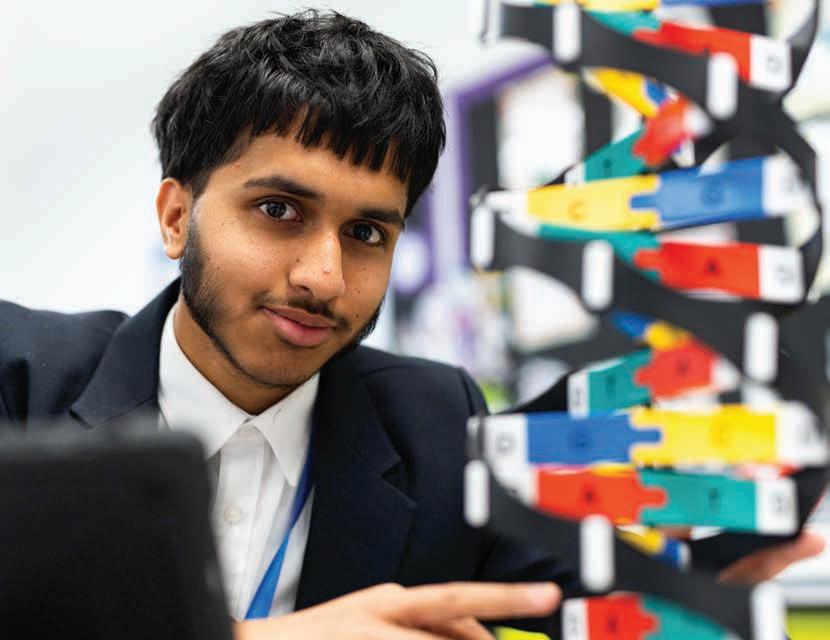


Introducing an outstanding Sixth Form





Shape your future with TB6


















Introducing an outstanding Sixth Form





Shape your future with TB6












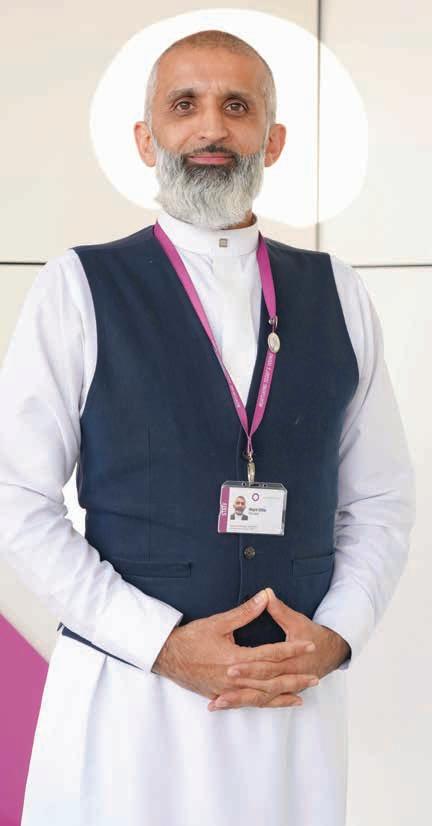
The question of where to continue your post 16 education is arguably one of the most important decisions you will have to make to date and getting it right is of paramount importance.
By focusing on faith, educational excellence, character development and community, TB6 aims to deliver a transformational experience from which young men emerge with a sense of outstanding aspiration and the highest expectation of themselves, whilst accepting the responsibility and duty to contribute to society’s wellbeing.
At TB6, we endeavour to offer an experience of world class learning and teaching, which will stretch and prepare students to pursue the most competitive UK or overseas university or a degree apprenticeship with a major national or global company.
We are proud to be part of Star Academies, one of the highest performing multi-academy trusts.
Please take the time to browse our website (www.tibhs.com) for further information and if you share our beliefs and aspirations then I look forward to receiving an application from you to secure a place at TB6.
Majid Ditta Principal


TB6 is the sixth form of Tauheedul Islam Boys’ High School, (TIBHS), an outstanding establishment and consistently placed amongst the highest performing schools nationally.
Building on the success of Tauheedul Islam Boys’ High School, at TB6 we aim to offer:
• Outstanding teaching and learning provision delivered by experts who are passionate, inspirational, pioneering and highly skilled at what they do.
• Exceptional teachers and a proven track record of excellent GCSE results at KS4.
• An inclusive and distinctive Islamic sixth form. Our faith lies at the heart of all that we do and we welcome students from all faiths and none.
Tauheedul Islam Boys’ High School is a national teaching school selected by the Department for Education for its excellence in teaching.
Tauheedul Islam Boys’ High School has consistently performed in the top 1% of schools in the country for exam results since its first set of GCSE results. The first cohorts of TB6 students have also performed exceptionally.
Specialised progress mentors and teachers will ensure that your individual support needs are fully met. Supervised study sessions and one-to-one tutorials with teachers will be timetabled for individual support.
You will be supported to fulfil your career goals and aspirations, including intense support for students who aspire to apply for competitive courses such as medicine or dentistry, places at Oxbridge or with leading companies.
Character development will be a key focus during your journey at TB6 with a super-curriculum and rich enrichment programme. You will be equipped with skills, dispositions and habits of mind to be well-rounded leaders of tomorrow.
• A small, family feel and unique, modern campus. We have a strong feeling of a cohesive community so all our students can thrive within a happy, safe and supportive environment.
• A ‘holistic’ educational experience with a real focus on strategic thinking and determination through our super-curriculum.
We consistently perform in the top 1%
of schools in the country






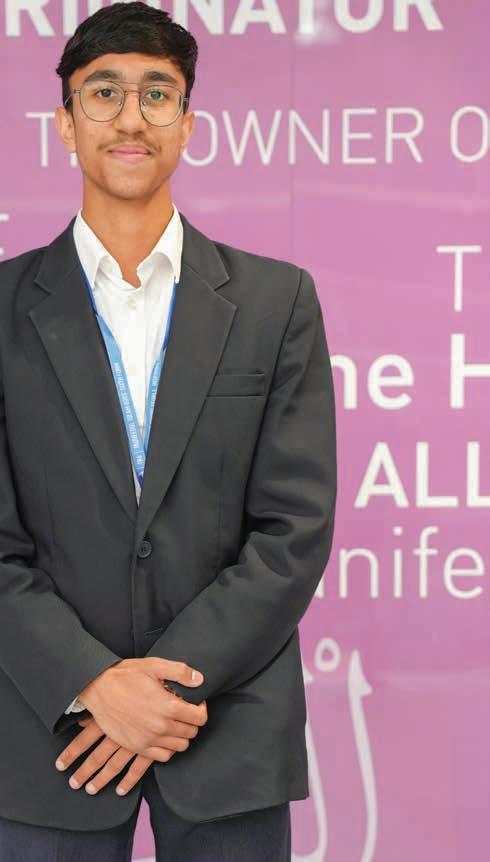
The school’s ambition extends to the new sixth form, where students thrive in the unashamedly academic environment. They are well supported to develop the confidence and experience necessary to secure prestigious destinations for their next steps in education or employment.
The school has designed a curriculum that goes beyond the typical, providing pupils with a wide range of learning experiences. The school has carefully considered the local and regional context, particularly in the design of the new sixth-form curriculum. It ensures that pupils are equipped with the knowledge and qualifications that allow them to progress to suitably aspirational next
Throughout school, pupils maintain the highest standards of conduct. Pupil leaders, as well as sixth-form students, are excellent role models for the school community. Pupils have high rates of attendance and


Visit us online at www.tibhs.com to find out more about our courses.
Applications to TB6 open in November. You can apply online at www.tibhs.com by simply clicking on the ‘Apply Now’ link.
You will be notified of your interview appointment by letter, with interviews taking place from January. During the interview, we will ensure you have chosen the right course to suit your future aspirations. This is a great opportunity for you to ask any questions you may have about your programme of study.
If you are successful at interview, you will receive a conditional offer via email.
You will receive an enrolment appointment letter during the summer term. Enrolment will take place from GCSE results day onwards.
September is the start of the new academic year and your life as a TB6 student!


We promote a culture of educational excellence from within a caring and secure Islamic environment enriched with the values of discipline, mutual care and respect, which extends beyond the sixth form into the wider community.

Our mission consists of the following three key elements.
• A belief that everybody has the potential to succeed within a high quality and intellectually challenging educational environment.
• A commitment to instilling high aspirations, a desire to learn and ambition to achieve.
• A personalised approach to securing excellence, stemming from a passionate belief that each individual is unique and special and capable of rising above any perceived limitations.
• A cohesive identity so that our students, their parents and communities feel a strong sense of belonging to the Star family.
Our STAR values are at the heart of everything we do.
Service
Being a responsible citizen in our community
Teamwork
Working together for excellence
Ambition
Aspiring to be our best
Respect
Treating others as we wish to be treated
• A passionate focus on a values-based education that instils honesty, integrity, compassion and mutual respect into all our pupils.
• A strong core of tenacity, self-respect and selfbelief that inspires each pupil to become the best person they can be.
• A determination to develop outstanding British citizens who are proud of, and contribute to, the social and economic prosperity of our country.
• A sense of personal accountability and of responsibility to others.
• A commitment to charitable endeavours and to making a difference to our world.
• A foodbank run by our sixth form students.
• Volunteering opportunities to support local businesses and organisations.
Leadership is a key component of our values. We focus on three leadership virtues:
To know and serve your community by working together to help to solve social issues.
To be goal oriented, have high ambitions, be reflective and demonstrate resilience.
To champion equality through resolving conflict, being a role model and being accountable.
In the sixth form, you will work within our Star Leadership Foundations to build your leadership skills and excel as a person, with regular evaluations of your progress. We strongly believe that the leaders of tomorrow must be nurtured through positive experiences today; that it is not enough simply to teach about good leadership, but that it must be experienced. Our Leadership Foundations capture this commitment to nurture and develop the leadership potential of TB6 students via the identification of moral, performance and civic virtues.
In placing leadership at the very heart of our organisation, we aspire to develop well-rounded, ethical and accomplished leaders of tomorrow. Student leaders who act from a strong
self-concept. Individuals who are passionate, determined and tenacious; willing to courageously lead and to humbly serve others.
Leadership opportunities include:
• LAMDA accredited public speaking and prose and verse programmes
• High-profile public speaking programme
• The Duke of Edinburgh’s Silver Awards
• Clubs and societies, including an international charity trip
• Mini MBA programme – a week’s intense programme of engaging with diverse employers, while undertaking a research project to culminate in a full business report
• Working with industry partners to design and develop highly intellectual programmes eg. In4.0 and Immersive Islam
• Partnership working with CyberFirst Partners
• Head Boy and Deputy Head Boy roles for Year 13 students
• Leadership opportunities within school; faith leaders and prefects with duties around school
• Casual tutors and mentors for GCSE pupils
• Leading Social Action initiatives such as the school’s Uniformity scheme and Foodbank, while coordinating charitable drives including the Winter Gift Programme



As you progress through the sixth form, you will refine your aims and aspirations and be supported to make decisions and choices for your future.
You will engage in our leading Careers Education, Advice and Guidance programme, which has consistently achieved all Gatsby 8 benchmarks in recent years – placing it amongst the highest quality careers programmes nationally.
Through our bespoke UCAS programme, you will receive support to complete application forms and visit multiple Russell Group and Ivy League universities. Our UCAS programme includes:
• University visits organised each academic year, including with Oxbridge, Russell Group and Ivy League universities
• Workshops for UCAS statements and interview preparation Masterclasses with Oxbridge, Russell Group and Ivy League universities
• UCAT and Oxbridge admission exams preparation
• Emerging Talent programmes for Medicine and Dentistry
• Strong links and partnerships with leading local universities to enhance progression opportunities and academic aspiration
A range of guest speakers will visit TB6 and deliver Leadership Lectures throughout the year to deliver diverse talks on university choices, progression pathways, labour market insight and apprenticeships.
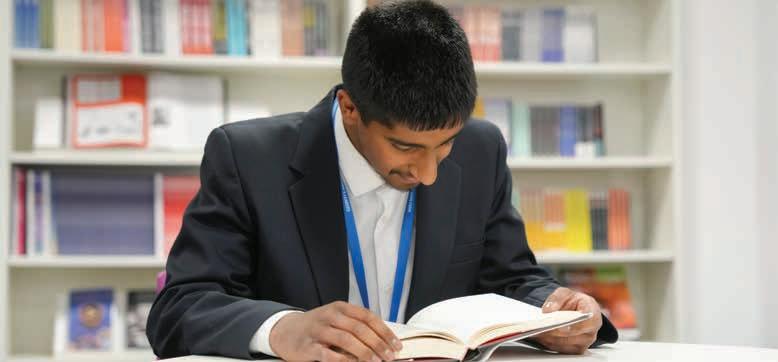













TB6 offers a new level of independence and a different relationship with teachers. Our TB6 students wear business suits and plan for a working day that fits in with a new type of learning.
At TB6, we are committed to providing the best learning experience for our students and preparing you for the wider world outside of school.
As a Microsoft Showcase School, we strongly believe that our students should have access to the best technology possible. You will receive a state-of-the-art digital device which you can use for your learning at TB6 and at home.
Having your own learning device will help you with seamless access to lesson resources, which are designed to make the most of technology. Being competent with technology is becoming increasingly important in the wider world and we will ensure students are as prepared as possible for a digital society. This also allows students to receive instant feedback from teachers through digital inking.
We have also invested in Up Learn, an online platform which brings together the latest learning research, AIpowered adaptive technology and world-class exam prep material.

The Faithful Stars Framework at TB6 is defined as a culture that contributes to, adheres to and promotes the teachings of the Islamic faith and in particular its emphasis on self-discipline, compassion, mutual respect for all people regardless of difference and respect for the earth itself.
TB6 believes that its Faithful Stars Framework is at the core of everything it does, and it will have the greatest impact on achievement and on the sustained success of the school and its learners. Such is the importance of our Faithful Stars Framework, it permeates all aspects of school life. The Framework has four strands: Community, Creativity, Curriculum and Character. Our faith lies at the heart of all that we do.
Our faith and character education includes:
• Charity events in aid of Macmillan Cancer Support, Tauheedul Islam Boys’ High School Foodbank, Age UK, NightSafe, Uniformity and others
• Our TB6 students run the school’s foodbank scheme and uniform upcycling charityUniformity
• Sunnah health – a health and wellbeing package based on the prophetic lifestyle
• Retreats – opportunities to take a reflective break from the daily challenges of sixth form life
• International experiences – trips to global areas of faith-based interest and in-person delivery of aid packages to developing countries
• Tutor activities including Hadith (Thought) of the Week, Surah Kahf, Surah Yaseen, Surah Fatiha and a full recital of the Qur’an on Fridays
• Sunnah Fast Programme – Monday and Thursday fasts during the winter months
• Giving back to TB6 and the main school through offering academic tutoring to other students in EBACC subjects
• Keynote Assemblies – special assemblies with high-profile external guests focusing on leadership, ambition, character and spiritual development
• Star Diploma – for academic excellence, character development and service to communities
• Tarbiyyah Mentoring – for times when you may be challenged with an unforeseen adversity. If a student is going through bereavement, family difficulties or crisis of faith issues, there are trained mentors available to support in a confidential manner
The ‘three I’s’ are fundamental to our school. The key characteristics which our students strive to perfect and improve each day are:
1. Ikhlas (Sincerity)
2. Ihsan (Going the Extra Mile)
3. Itqan (Striving for Excellence)
You will be challenged to continuously improve in these areas and guided to be mindful of your adherence to them.


At TB6, we endeavour to balance the rigour of carefully crafted examination preparation with the development of research skills and the ability to debate, communicate confidently, solve problems and think both critically and creatively. These skills have inherent, lifelong value and universities often favour candidates who can demonstrate these attributes.
The TB6 Excellence programme encapsulates all those activities that foster academic endeavour beyond the measurable outcomes of examination results. It includes (but is not limited to):
• Wide and habitual reading to cultivate intellectual curiosity
• Extended project work, research, and academic competitions
• Debate, public speaking, and lectures to build confidence and communication skills
• Study trips and cultural enrichment experiences
• Faith and Character Education sessions that nurture spiritual growth, ethical leadership, and values-based decision-making
• Academic mentoring and peer tutoring
• Level 3 Extended Project Qualifications (EPQs)
• Scholarship opportunities in collaboration with our partners
• Work experience in Year 12
This comprehensive programme ensures that every TB6 student is equipped not only for academic success but also for life beyond sixth form, as confident, responsible, and values-driven individuals.
Our Enrichment and Leadership Programme includes:
• Leadership development initiatives, bespoke careers advice, and volunteering opportunities to strengthen personal statements
• Participation in prestigious programmes such as Gray’s Inn’s Griffin Access Programme
• University visits in Year 12, alongside talks from guest speakers on competitive admissions and degree apprenticeships
• Mindset and healthy habits workshop
• Feeder college for apprenticeships at prestigious organisations
• High-profile sector-specific external speakers programme
• Professional mentoring programme from sector experts
• Individual, bespoke progression support to pursue leading employment and degree choices
• National and international work experience programme
• Volunteering opportunities, within and outside of college
• Fundraising for charitable causes and the creation of student-led societies, such as the Medical Society


• Plethora of international trips and visits to enrich lives and broaden mindsets
Sports will be an integral part of the TB6 extra-curricular offer. A programme designed to encourage a rich and diverse experience for our students.
Whilst many students enjoy playing sports, the process of engaging in sport at TB6 also embodies many qualities promoted by the sixth form. Learning to win and lose; to lead and be led; to push oneself to, and perhaps beyond, one’s perceived limits; to think as part of a team; to know when to strive for more and when to acknowledge defeat – these qualities will help students to succeed in their lives and careers.


At TB6 we offer state-of-the-art facilities including:
• A large indoor sports hall including badminton, pickleball and basketball courts
• Access to a fully-equipped, modern gym
• An outdoor multi-use games area, including a football pitch
Organised sports clubs will be offered during the academic year including:
• Football with leagues and tournaments organised internally and with other colleges
• Cricket with opportunities to play in league games
As a member of the sports academy, you will:
• Develop your coordination and concentration skills
• Raise your performance levels
• Improve your effectiveness in your academic studies

As well as supporting your academic development, we aim to deliver the best pastoral care possible.
• TB6 has its own Head of Year who is responsible for ensuring the welfare of students and who works closely with parents and guardians to provide a coherent support structure for each young person with a face-to-face conversation and online portal.
• A full programme of activities will be delivered during morning registration time for personal and pastoral development
• We have an assembly programme – with frequent high-profile guest speakers
• We have a range of activities to develop our students as leaders, which includes:
• Key roles and opportunities, such as Head Boy and Deputy Head Boys, Shura (Council) Representative, Librarian, Journalist, Prefects and Ambassadors for the school
• Representing the school in competitions, such as the English Speaking Union’s Mace Debate
• Participating in programmes such as The Duke of Edinburgh’s Silver Award








A purposeful, orderly and productive environment for learning will be available exclusively to TB6 students in our Private Study Space. Students will be able to visit at any time during free periods.
The TB6 Private Study Space is supervised at all times and students are timetabled to attend upon recommendations from subject teachers.
Selected learners will be targeted to receive subjectspecific 1:1 support for 30 minutes each week from subject specialists to ensure each learner is on track to achieve minimum academic targets.
The private study sessions are timetabled to support you in managing your workload. Good habits will be cultivated from the very beginning of your studies at TB6; every minute will be precious and you will be guided through best study habits to ensure success.
All of the work is accessible through OneNote so students can access from anywhere, and teachers can monitor the work produced. You will also be able to use Up Learn to consolidate all learning.
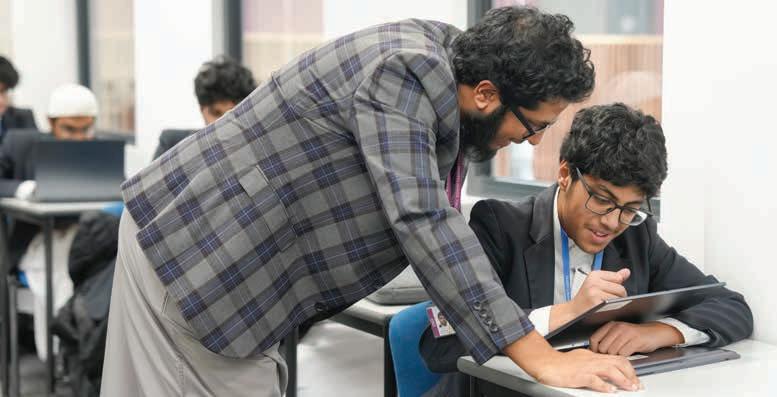









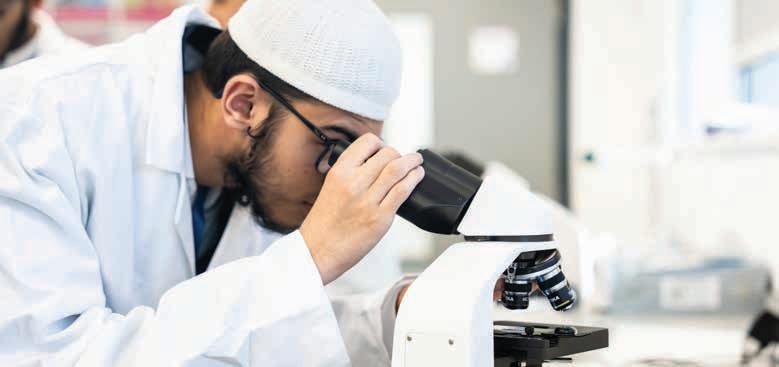
Our pursuit of academic excellence is based on a simple premise; that, upon graduating from TB6, every student fulfils their potential and is supported to secure the best possible academic results.
This process involves a great deal of hard work from all involved – the school and its teachers, parents and guardians, and, most importantly, the students themselves.
What underpins excellence at TIBHS is what happens in the classroom, the way we teach, how we assess and how we promote a culture of achievement in the school.
As a narration of the Prophet Muhammad [pbuh] teaches us, ‘People are like treasures – just like treasures of gold and silver.’ As we are aware, gold and silver do not simply come out of the ground ready to be made into jewellery. Much effort is spent locating the gold, extracting it from the ground, and then craftsmen labour for hours on end to turn these materials into things of beauty.
Lesson planning is combined with effective deployment of teaching skills and judicious interventions so that students acquire knowledge, develop understanding and learn and practise skills exceptionally well and are able to apply what they have learned with increasing independence.




Our first two TB6 cohorts left with outstanding sets of results, with students making excellent progress in their two years at the Sixth Form. TIBHS has also consistently been ranked in the top 1% of schools nationally in the Government GCSE league tables for the progress that students make.
These results demonstrate the real determination of our staff and governors to create a school where no stone is left unturned in the pursuit of excellence.
% of A Levels completed at A* Measure
% of A Levels completed at A*-A
% of A Levels completed at A*-B
% of A Levels completed at A*-C
% of students achieving 3 A*-As
% of students achieving 3 A*-Bs
% of students achieving 3 A*-Cs
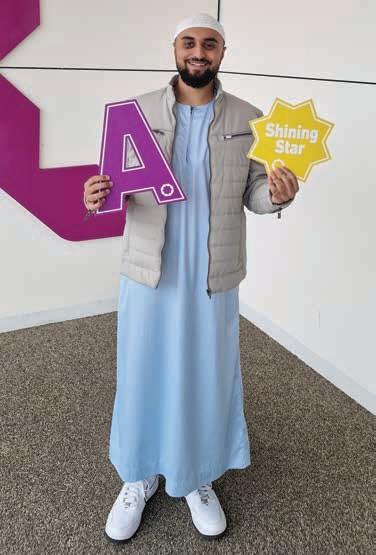


TI BH Shasconsistentlybeenrankedinthetop1%ofscho ol snat io nally intheGovernmen t leaguetablesf or theprogressthatstudentsmake.
These results demonstrate the real determination of our staff and governors to create a school where no stone is left unturned in the pursuit of excellence. After completing their GCSEs in Year 11, all of our students go on to Further Education or training (100% in 2019 and 2020).
Our exam results – shown in the table below –consistently place TIBHS amongst the highest performing state schools in the country.
TIBHS GCSE Results
GCSE Results
Measure 2023 Nat. Avg 20182019 2020 (CAGs) 2021 (CAGs) 20222023
Our GCSE exam results – shown in the table below – consistently place TIBHS amongst the highest performing state schools in the country.
9-5 in
& Maths
All percentage figuresabove havebeenroundedtothe nearest whole number
(EBacc) isaperformance measureforstudents who achievegood
All percentage figuresabovehavebeenroundedtothenearestwholenumber *TheEnglishBaccalaureate(EBacc)isaperformancemeasureforstudents
Our curriculum offers core and facilitating STEM-related subjects that will enable students to progress to leading universities and employers.
Our sixth form is traditional and academic. We only offer ‘Level 3’ A level provision with limited vocational qualifications. You will complete a two-year linear course in all subjects culminating in A level qualifications.
In order to join us you will need to achieve excellent GCSE results, attaining at least five GCSEs at grades 9-6, including minimum grade 5 in GCSE English Language or Literature and GCSE Mathematics to pursue A levels. Vocational courses require a grade 5 or above in specified courses, as well as a grade 4 in GCSE English Language or Literature and Mathematics.
A levels
• Biology
• Chemistry
• Computer Science
• Economics
• Mathematics
• Physics
• Psychology
• Sociology
• Modern Foreign Languages (Arabic or Urdu)
• BTEC Applied Science or T Level in Science













































Studying AQA A level Biology will give you an insight into how the living world around you works. The study of Biology ranges from learning about the vital molecules which are the building blocks of life, to the structures and functions of cells, tissues and organs and what happens when they go wrong. The curriculum spans all the way to learning about the positive and negative interactions between organisms and the study of ecosystems.
Alongside in-depth knowledge of the biological world, biologists also develop skills and understanding of scientific methods, data analysis, observation, correlations and causal relationships.
This course involves development of practical skills, foundations in biology, exchange and transport, biodiversity, evolution and disease, communications, homeostasis and energy, genetics and ecosystems.
A level Biology involves the study of all the traditional areas of Biology as well as an examination of technological advances in areas such as DNA technologies, fingerprinting, genetic engineering and gene therapy.
The fundamental ideas in Biology will be covered including how the body defends itself against disease, cellular operations and the creation and roles of important biological molecules such as carbohydrates, proteins, lipids and DNA.
To complete the AS course, you will complete two examinations at the end of the first year. Papers 1 and 2: Biological molecules, Cells, Organisms exchange substances with their environment, Genetic information, variation and relationships between organisms Each paper is a 1 hour 30 minutes written exam and is worth 50% of the AS qualification.
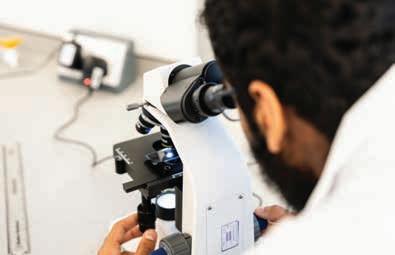
To complete the A level course, you will complete three examinations at the end of the second year. Paper 1: Biological molecules, Cells, Organisms exchange substances with their environment, Genetic information, variation and relationships between organisms
Paper 2: Energy transfers in and between organisms, Organisms respond to changes in their internal and external environments, Genetics, populations, evolution and ecosystems, The control of gene expression
Paper 3: A combination of papers 1 and 2 Each paper is a 2 hours written exam. Paper 1 and Paper 2 are worth 35% the A Level qualification, while Paper 3 is worth 30%.
You will also complete twelve formal practical assessments during the course. These will be assessed separately and will be reported alongside your A level grade but will not count towards it.
Agriculture
Optometry
Dentistry
Medicine
Surgeon

Biochemist
Pharmaceutical
Representative
Medical and Health Services Manager
Financial Analyst
Physician


OCR A level Chemistry builds on your GCSE knowledge and explores concepts in greater depth. It attempts to answer the big question ‘what is the world made of?’. It is the search for this answer that makes Chemistry so fascinating. From researching a new wonder drug to save millions of lives, a new lighter and cheaper battery or a carbon dioxide capture material to slow global warming, there are many different paths that the study of Chemistry can lead you down.
Topics fall into three main categories: physical Chemistry, inorganic Chemistry and organic Chemistry.
Specific areas of study include aspects such as atomic structure, energetics, kinetics, oxidation, alkanes and alkenes, thermodynamics, polymers and amino acids, proteins and DNA.
As it is a science subject, the process of learning Chemistry will help you to learn how to be objective, analytical and methodical, and in turn to process and solve problems. You can apply these skills outside academia, and the study of Chemistry can help understand current events, such as fossil fuels, environmental issues, health, product scares and more.
To complete the AS course, you will complete two examinations at the end of the first year.
Paper 1: Breadth in Chemistry
Paper 2: Depth in Chemistry
Each paper is a 1 hour 30 minutes written exam and is worth 50% of the AS qualification.
To complete the A level course, you will complete three examinations at the end of the second year.
Paper 1: Periodic table, elements and physical Chemistry
Paper 2: Synthesis and analytical techniques
Paper 3: Unified Chemistry
Papers 1 and 2 are 2 hours 15 minutes written
exams, each worth 37% of the A Level qualification. Paper 3 is a 1 hour 30 minutes written exam, worth 26%.
You will also complete twelve formal practical assessments during the course. These will be assessed separately and will be reported alongside your A level grade but will not count towards it.
Medicine
Dentistry
Chemical Engineering
Pharmacy
Higher Education Lecturer
Pharmaceuticals
Software Design
Analytical Chemist
Research Scientist (Physical Science)

OCR A Level Computer Science allows every student to build a strong foundation in programming whilst also providing an awareness of the management and organisation of computer systems. The Python programming language taught will further develop the skill set developed by learners at GCSE, but also gives students new to programming the essential skills to progress to University and employment. The course will provide students with further opportunities to develop their skills in a range of other programming languages including Java and C#.
With the emphasis on Computer Science, students will learn to become effective designers and implement computing solutions. You will develop practical skills, including design, development, testing, and evaluation.
To complete the AS course, you will complete two examinations at the end of the first year.
To complete the A level course, you will complete two examinations and a coursework project. In both years, the examinations are:
Paper 1: Computer Systems
Paper 2: Algorithms and Programming
At the end of the first year, both papers are 1 hour 15 minutes written exams and are worth 50% of the AS qualification.
At the end of the second year, both papers are 2 hours 30 minutes written exams and are worth 40% of the A Level qualification. The Programming Project is worth 20%.
Career pathways include:
App Developer
Game Designer
CAD Technician
Security Analyst
Software Developer
Software Analyst
Cyber Security
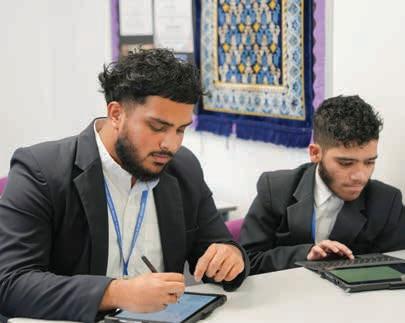


Edexcel A Level Economics is the study of the production and consumption of goods and the transfer of wealth to produce and obtain those goods. Economics explains how people interact within markets to get what they want or accomplish certain goals.
Since economics is a driving force of human interaction, studying it often reveals why people and governments behave in particular ways. Economics offers a unique insight into how the world works and helps you to understand many of the big questions facing people today, such as how badly will the UK be impacted by an extended period of low global growth? What can we do about global warming, and should patients be charged for hospital treatment?
The course content is split into two main sections. The first section introduces students to microeconomic issues and the second section covers mainly macroeconomic issues.
Microeconomics includes looking at demand and supply, market structures, the labour market and the causes of market failure. Macroeconomics will include national and international economy. You will look at the objectives of government economic policy, macroeconomic indicators, globalisation and the financial sector.
To complete the AS course, you will complete two examinations at the end of the first year.
Paper 1: Operation of markets and market failure.
Paper 2: UK economy.
Each paper is a 1 hour 30 minutes written exam and is worth 50% of the AS qualification.
To complete the A level course, you will complete three examinations.
Paper 1: Markets and business behaviour.
Paper 2: National and global economy
Paper 3: Micro and Macro Economics.
Each paper is a 2 hours written exam. Paper 1 and Paper 2 are worth 35% the A Level qualification, while Paper 3 is worth 30%.
Economic Research Analyst
Financial Analyst
Personal Financial Adviser
Environmental Economist
Chartered Accountant
Management Accountant
Journalist
Academic Economist
Auditor
Data Analyst






Edexcel A Level Mathematics is a subject of logic and problem solving that involves the study of algebra, statistics and pure mathematics. Mathematics is about studying and investigating pattern and structure. If you enjoy the challenge and the clarity that solving mathematical problems brings then A level Mathematics is for you.
As a mathematician, your ability to think in a clear and logical way will be highly sought after by universities and employers alike. Recent research suggests that people with A level Mathematics can earn 10% more than colleagues with similar qualifications. The problem-solving nature of A level Mathematics makes it a much sought-after entry qualification for a wide variety of university courses and careers.
The core of the subject is Pure Mathematics with a focus on algebra, graphs and trigonometry. A level Mathematics extends students to form the basic ‘tool kit’ on which all mathematics is based. Calculus, the mathematics of growth and change, on which so many applications depend, is also developed. You will also study two areas of Applied Mathematics: Mechanics and Statistics. Mechanics is the study of forces and the movement of objects and has many applications in the sciences, particularly Physics and engineering. Statistics is the mathematics of data or information processing and extends many ideas including averages, standard deviation, and probability.
To complete the AS course, you will complete two examinations at the end of the first year.
Paper 1: Pure Mathematics
Paper 2: Statistics and Mechanics
Paper 1 is a 2 hours written exam, worth 62.5% of the AS qualification. Paper 2 is a 1 hour 15 hours written exam, worth 37.5% of the AS qualification.
To complete the two-year A level course, you will complete three examinations at the end of the second year.
Paper 1: Pure Mathematics
Paper 2: Pure Mathematics
Paper 3: Statistics and Mechanics
Each paper is a 2 hours written exam, each worth 33.3% the A Level qualification.
Data Scientist
Actuary
Statistician
Games Designer
Education
Engineering
Business and Finance
Banking
Scientific careers, such as Medicine Accountancy
AQA A Level Physics is an extremely challenging and stimulating subject. Physics is both the everyday and extraordinary, from explaining why the sky is blue, to understanding quantum theory and Einstein’s relativity. Physics challenges our imaginations with concepts like string theory and leads to great discoveries, like computers and lasers, that lead to technologies which change our lives—from healing joints, to curing cancer, to developing sustainable energy solutions.
It combines practical investigations and experiments with theoretical ideas, giving you the skills to logically analyse and solve problems; skills that can be applied to any scientific or mathematical challenge. Physics covers the very small: atoms and electrons, to the very large: stars and galaxies. In Physics, fundamental questions are probed – how did it all begin and how will it all end?
In year 1, the specification is introduced with “Measurements and their errors”; aimed to introduce important conventions and ideas that permeate the fabric of Physics. “Particles and Radiation” introduces students both to the fundamental properties of matter and to electromagnetic radiation and quantum phenomena. The “Waves” module extends studies of wave phenomena through a development of knowledge of the characteristics, properties and applications of travelling waves and stationary waves. In the “Mechanics and Materials” module, vectors and their treatment are introduced followed by understanding of forces, energy and momentum. “Electricity” provides opportunities for the development of practical skills and lays the groundwork for electrical applications that are important to society.
In Year 2, modules include further mechanics and thermal Physics, fields and their consequences. Nuclear Physics is also included, studying the Physics that underpins nuclear energy production and the impact that it can have on society.

To complete the AS course, you will complete two examinations at the end of the first year.
Papers 1 and 2: Measurements and their errors, Particles and radiation, Waves, Mechanics and materials, Electricity
Each paper is a 1 hour 30 minutes written exam and is worth 50% of the AS qualification.
To complete the two year A level course, you will complete three examinations at the end of the second year.
Paper 1: Year 1 content & Further Mechanics
Paper 2: Thermal Physics, Nuclear Physics & Fields
Paper 3: Practical Skills, Data Analysis & Turning Points in Physics
Each paper is a 2 hours written exam, each worth 33.3% the A Level qualification. You will also complete twelve formal practical assessments during the course. These will be assessed separately and will be reported alongside your A level grade but will not count towards it.
Engineering
Physical Sciences
Astrophysics
Cosmology
Aeronautical
Motorsport or Mechanical Engineering
Medical Physics
Architecture
Pilot studies
Computing




AQA A Level Psychology is the study of human behaviour. It applies the principles of both science and humanities in trying to explain why people behave in certain ways. Studying Psychology involves understanding research and the explanations that have been developed from it. Examples of behaviour that will be studied will include: obedience, prejudice, memory, phobias and aggression. In Year 13 students will also look at Clinical Psychology and Child Development as well as wider issues in Psychology.
The Psychology course is examined by a mixture of question styles including short and extended questions and stimulus data response.
To complete the AS course, you will complete two examinations at the end of the first year.
Paper 1: Introductory Topics in Psychology
Paper 2: Psychology in Context
Each paper is a 1 hour 30 minutes written exam and is worth 50% of the AS qualification.
To complete the two-year A level course, you will complete three examinations at the end of the second year.
Paper 1: Introductory Topics in Psychology
Paper 2: Psychology in Context
Paper 3: Issues & Options in Psychology
Each paper is a 2 hours written exam, each worth 33.3% the A Level qualification.
Career pathways include:
Clinical Psychologist
Educational Psychologist
Medicine
Academic Researcher
Forensic Psychologist
Counselling
Psychiatry
Child Therapy
Teaching
Policing
Forensic Science
Human Resources
AQA A Level Sociology is the study of Society, the ‘social world’: you will study the way people are affected by society, and how society is affected by people. Sociology looks beyond the day-to-day and asks questions like “what is the real nature of Society, why does it function like it does and for whose benefit?”
In Sociology, we will ask you to understand and apply key concepts such as power, gender, ethnicity and class to analyse the most important institutions, which shape the world we live in. At AS Level, you will study education and the family, address questions such as, “why do girls do better than boys at GCSE?” and, “what is the impact of an increasingly ageing population?”
At A Level, you will consider crime and the one institution that appears to influence every aspect of our lives – the mass media. In both your first and second year, you will consider the usefulness of the different research methods used by Sociologists.
The AS course is assessed by two written examinations at the end of the first year.
Paper 1: Education with Methods in Context.
Paper 2: Research Methods and Topics in Sociology (Families and Households).
Each Paper is a 1 hour 30 minutes written exam worth 60 marks and 50% of the AS qualification.
The A level course is assessed by three written examinations at the end of the second year.
Paper 1: Education with Theory and Methods.
Paper 2: Topics in Sociology (Mass Media and Families).
Paper 3: Crime and Deviance with Theory and Methods.
Each Paper is a 2-hour written exam worth 80 marks each and a third of the full A level.
Politics Social Work
Journalism
Public Research
Teaching
Human Resources
Criminal Justice
Market Research
Social Policy




Applied Science is an excellent choice of subject if you enjoy science, particularly the practical side of the subject. It allows you to develop your understanding in all three sciences; Biology, Chemistry and Physics and to develop the skills to solve real life, scientific problems.
Throughout the course, you will learn how to collect data, how to evaluate it and how to draw conclusions – skills that will help you, not just in higher education and employment, but throughout life. Throughout the course you will have the opportunity to perform a variety of experimental work and will also learn how to work safely within a laboratory environment and to use Maths and statistics to analyse experimental data.
The BTEC Level 3 National Extended Diploma in Applied Science involves the study of the practical applications of Science and incorporates the study of all three Sciences – Chemistry, Biology and Physics – in thirteen units.
• Principles and applications of science: you will study topics ranging from cells, atomic structure and bonding to waves and communications.
• Practical scientific procedures and techniques: you will study practical techniques ranging from titrations, colorimetry, calorimetry and chromatography.
• Science investigation skills: you will develop your scientific skills including recording and interpreting data and analysing and evaluating scientific findings.
• Applied science: a unit in which you further develop your theory and practical skills.
Over two years, you will study 13 units, nine are internally assessed and four are externally assessed.
Students will complete two external units in the first year of study and two in the second year of study. All thirteen units (internal and external) are used to determine the final grade.
The course is assessed through the completion of seven mandatory units plus six optional units which in total is equivalent to three A levels.
Pharmacy
Radiography
Audiology
Education
Forensics
Occupational Therapy
Biochemistry
Physiology
Electrical Engineering
Paramedic
Studying a T Level in Science offers a unique blend of academic knowledge and practical experience, preparing you for a career in healthcare, research, or laboratory work. This qualification combines classroom learning with an industry placement, giving you hands-on skills that employers value.
You’ll explore core scientific principles, laboratory techniques, and health and safety practices, while developing problem-solving and analytical abilities. T Levels are equivalent to three A Levels and provide clear progression routes to university, apprenticeships, or skilled employment. If you’re passionate about science and want real-world experience alongside your studies, a T Level is an excellent choice.
All students will develop a general understanding of health and science:
• working within the health and science sector
• health, safety and environmental regulations
• managing information and data
• principles of good scientific and clinical practice
• core science concepts including the structure of cells, tissues and large molecules, genetics, microbiology and immunology
You will also learn about topics specific to science:
• understanding the science sector
• further science knowledge, including cell cycle and cellular respiration, enzyme and protein structure, pathogens, classification of biological materials, kinetic changes and relevant analytical techniques
• scientific methodology
• experimental equipment and techniques
• ethics of science
You will also complete an industry placement for 9 weeks in various Science settings.
The T-Level will be assessed through a range of methods:
• Two external exams (paper A and B)
• Employer Set Project (ESP)
• Synoptic assignments
• Work Placements (45 days in placement)
Pharmacy
Radiography
Audiology
Education
Forensics
Occupational Therapy
Biochemistry
Physiology
Electrical Engineering
Paramedic
Nursing





Stage 1: November
Stage 1: November 2025
Attend the TB6 open evening to find out more about life at our sixth form. Please visit www.TB6.co.uk for detailed information. The evening is an excellent opportunity for you to get a feel for the TB6 community and meet prospective students and staff.
Attend the TB6 open evening to find out more about life at our sixth form. Please visit www.tibhs.com for detailed information. The evening is an excellent opportunity for you to get a feel for the TB6 community and meet prospective students and staff.
Stage 2: December
Stage 2: November -December 2025
After the Open Evening, our online application process will go live on the TB6 website. You will select a minimum of three A levels to study, or one vocational course. Offers are then based on the predicted grades provided by your school.
After the Open Evening, our online application process will go live on the TIBHS website. You will select four A levels to study, or one vocational course.
Offers are then based on the predicted grades provided by your school.
Stage 3: January 2026
Stage 3: February
You will be given an interview appointment by letter, which will take place in January. At the interview, we will discuss your subject choices to make sure you have chosen the subjects that will help you achieve your career aspirations. This is a great opportunity for you to ask any questions you may have about your programme of study.
You will be given an interview appointment by letter, which will take place in February. At the interview, we will discuss your subject choices to make sure you have chosen the subjects that will help you achieve your career aspirations. This is a great opportunity for you to ask any questions you may have about your programme of study.
Stage 4: Late February
Stage 4: February 2026
We will write to all applicants to explain whether you have been offered a conditional place for September.
We will write to all applicants to explain whether you have been offered a conditional place for September.
We look forward to helping you shape your future at TB6.
We look forward to helping you shape your future at TB6.



I began my Tauheedul journey at the age of 11 with the simple notion of wanting to do my best, but all praise to God, the soaring heights I was able reach, made me realise that you can truly reap the rewards of your labour!
I began my Tauheedul journey at the age of 11 with the simple notion of wanting to do my best, but all praise to God, the soaring heights I was able reach, made me realise that you can truly reap the rewards of your labour!
I had an emotional childhood, which I’ll keep brief, but I was orphaned overnight with my parents tragically passing away in a house fire. As a child it can be quite easy to lose sight of the future and fear the prospect of standing alone. While I could have despaired and continued to be a victim of my circumstance, I chose to make something of myself which will benefit our community.
I had an emotional childhood, which I’ll keep brief, but I was orphaned overnight with my parents tragically passing away in a house fire. As a child it can be quite easy to lose sight of the future and fear the prospect of standing alone. While I could have despaired and continued to be a victim of my circumstance, I chose to make something of myself which will benefit our community.
Tauheedul was a perfect fit for me as I received a plethora of opportunities, ranging from being elected as Head boy, representing the school in Belgium for the WWI centenary programme and partaking in numerous debating competitions in which I was able to foster the STAR values. For 4 years, I was able to champion a ‘Food for all initiative’ for struggling local families. And being able to witness the subsequent joy, brought from a willingness to empathise, was truly rewarding. Furthermore, I encouraged my peers to offer service, have ambition, work together to be stronger as one body and respect all those around us and the environment.
Tauheedul was a perfect fit for me as I received a plethora of opportunities, ranging from being elected as Head boy, representing the school in Belgium for the WWI centenary programme and partaking in numerous debating competitions in which I was able to foster the STAR values. For 4 years, I was able to champion a ‘Food For All initiative’ for struggling local families. And being able to witness the subsequent joy, brought from a willingness to empathise, was truly rewarding. Furthermore, I encouraged my peers to offer service, have ambition, work together to be stronger as one body and respect all those around us and the environment.
However, in life there are highs and lows, and when I did not gain entry into dental school on my first attempt, initially I was disheartened, but I decided to take a gap year, with hopes to improve my application and reapply. A testament to my connection with my former high school was highlighted, when I returned during my gap year, to assist students in the SEN department.
However, in life there are highs and lows, and when I did not gain entry into dental school on my first attempt, initially I was disheartened, but I decided to take a gap year, with hopes to improve my application and reapply. A testament to my connection with my former high school was highlighted, when I returned during my gap year, to assist pupils in the SEN department.
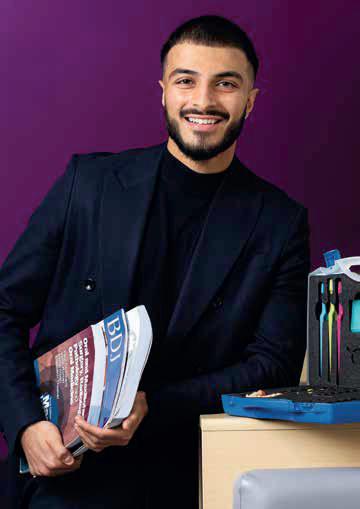
It with the school’s support, that ultimately my university application was successful, and I was able to gain entry to study Dentistry at the University of Leeds, where I am currently enjoying my fourth year of undergraduate studies.
It was with the school’s support, that ultimately my university application was successful, and I was able to gain entry to study Dentistry at the University of Leeds. It is a dream come true and I am honoured to be able to share with you that it was this school and my teachers who helped me to achieve my potential.
It is a dream come true and I am honoured to be able to share with you that it was this school and my teachers who helped me to achieve my potential.








